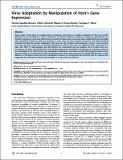Por favor, use este identificador para citar o enlazar a este item:
http://hdl.handle.net/10261/48903COMPARTIR / EXPORTAR:
 SHARE SHARE
 CORE
BASE CORE
BASE
|
|
| Visualizar otros formatos: MARC | Dublin Core | RDF | ORE | MODS | METS | DIDL | DATACITE | |

| Campo DC | Valor | Lengua/Idioma |
|---|---|---|
| dc.contributor.author | Agudelo-Romero, Patricia | - |
| dc.contributor.author | Carbonell, Pablo | - |
| dc.contributor.author | Pérez-Amador, Miguel A. | - |
| dc.contributor.author | Elena, Santiago F. | - |
| dc.date.accessioned | 2012-04-25T10:00:21Z | - |
| dc.date.available | 2012-04-25T10:00:21Z | - |
| dc.date.issued | 2008-06-11 | - |
| dc.identifier.citation | PLoS ONE 3/6: e2397 (2008) | es_ES |
| dc.identifier.uri | http://hdl.handle.net/10261/48903 | - |
| dc.description.abstract | Viruses adapt to their hosts by evading defense mechanisms and taking over cellular metabolism for their own benefit. Alterations in cell metabolism as well as side-effects of antiviral responses contribute to symptoms development and virulence. Sometimes, a virus may spill over from its usual host species into a novel one, where usually will fail to successfully infect and further transmit to new host. However, in some cases, the virus transmits and persists after fixing beneficial mutations that allow for a better exploitation of the new host. This situation would represent a case for a new emerging virus. Here we report results from an evolution experiment in which a plant virus was allowed to infect and evolve on a naı¨ve host. After 17 serial passages, the viral genome has accumulated only five changes, three of which were nonsynonymous. An amino acid substitution in the viral VPg protein was responsible for the appearance of symptoms, whereas one substitution in the viral P3 protein the epistatically contributed to exacerbate severity. DNA microarray analyses show that the evolved and ancestral viruses affect the global patterns of host gene expression in radically different ways. A major difference is that genes involved in stress and pathogen response are not activated upon infection with the evolved virus, suggesting that selection has favored viral strategies to escape from host defenses. | es_ES |
| dc.description.sponsorship | This work was supported by grants BFU2006-14819-C02-01/BMC (Spanish MEC-FEDER), ACOMP07/263 (Generalitat Valenciana), and the EMBO Young Investigator Program to SFE. PAR and PC received fellowships from the Spanish Ministerio de Educacio´n y Ciencia. | es_ES |
| dc.language.iso | eng | es_ES |
| dc.publisher | Public Library of Science | es_ES |
| dc.relation.isversionof | Publisher's version | - |
| dc.rights | openAccess | es_ES |
| dc.title | Virus Adaptation by Manipulation of Host’s Gene Expression | es_ES |
| dc.type | artículo | es_ES |
| dc.identifier.doi | 10.1371/journal.pone.0002397 | - |
| dc.description.peerreviewed | Peer reviewed | es_ES |
| dc.identifier.e-issn | 1932-6203 | - |
| dc.identifier.pmid | 18545680 | - |
| dc.type.coar | http://purl.org/coar/resource_type/c_6501 | es_ES |
| item.openairetype | artículo | - |
| item.grantfulltext | open | - |
| item.cerifentitytype | Publications | - |
| item.openairecristype | http://purl.org/coar/resource_type/c_18cf | - |
| item.fulltext | With Fulltext | - |
| item.languageiso639-1 | en | - |
| Aparece en las colecciones: | (IBMCP) Artículos | |
Ficheros en este ítem:
| Fichero | Descripción | Tamaño | Formato | |
|---|---|---|---|---|
| PlosOne_3_32397_2007.pdf | 209,71 kB | Adobe PDF |  Visualizar/Abrir |
CORE Recommender
PubMed Central
Citations
36
checked on 18-mar-2024
SCOPUSTM
Citations
67
checked on 16-abr-2024
WEB OF SCIENCETM
Citations
66
checked on 23-feb-2024
Page view(s)
332
checked on 19-abr-2024
Download(s)
251
checked on 19-abr-2024
Google ScholarTM
Check
Altmetric
Altmetric
Artículos relacionados:
NOTA: Los ítems de Digital.CSIC están protegidos por copyright, con todos los derechos reservados, a menos que se indique lo contrario.
